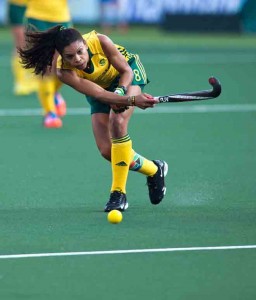Her mother might have missed out on international recognition, but South African hockey legend Marsha Cox is more than making up for it
Ask most sports fans who is the most internationally capped sports person in South Africa and you are likely to get answers such as legendary cricketer Jacques Kallis or rugby union’s John Smit. Very few people would think to mention the captain of the women’s hockey team, Marsha Cox.
But with more than 320 caps to her name, Marsha Cox – née Marescia – surpasses all these South African sporting legends and, in both the hockey world and the black community, Marsha is an iconic sportswoman whose story is one that symbolises the changes that have taken place in South Africa over the past three decades, and the difficulties that continue to make life as an international sports player a struggle.
It was written in the stars that Cox would become a hockey player. The vast majority of her childhood, she recalls, was spent on the side of a hockey pitch, knocking a ball around while her mother, Marian Marescia, played or coached hockey. Marian remains known as “the best South African never to play for her country”, due to the apartheid laws that prevented South Africa competing on the international stage in the 1990s.
“When I play hockey now, I struggle to keep the tears back when the national anthem plays because I am always reminded of the struggle that our country has been through,” says Cox, 31. At the recent Hockey World Cup, which took place in The Hague in the Netherlands, Cox’s mother was in the crowd and as Nkosi Sikelel’ iAfrika – the South African national anthem – rang out, both mother and daughter were clearly emotional. “Having your mother in the crowd watching you is always special, but knowing that you are doing something that she had the ability to do, but never had the opportunity to do, that makes you humble and drives you on to do your very best.”
Growing up, Marsha says that she was not directly affected by apartheid, but she has seen her team go through some very tough times as they struggled to get recognition on the international stage. Following the end of apartheid, sports teams were forced to adhere to some strict rules on team composition – there had to be a quota of black people in the national team whether they were the best players or not. This caused problems with selection and played havoc with team morale. Quotas blighted all major sports in South Africa for a number of years in the late 1990s and early 2000s and, for a sport such as hockey, where it was mainly played in affluent, white schools, finding young, black talented players was problematic.
Happily those times have passed now, with the South Africa women’s team taking fourth place at this summer’s Commonwealth Games after losing 5-2 to New Zealand in the battle for bronze. At the earlier Champions Challenge hockey event in Glasgow, where South Africa picked up a bronze medal, the chief executive officer of the South Africa Sport Confederation and
Olympic Committee, Tubby Reddy, said he was delighted to look at a South African women’s hockey team that was both representative of South Africa’s population and had been picked solely on ability. Much of this is thanks to the work of the South Africa Hockey Association and its long-term participation programme – part of its strategy is to work with schools in townships to teach hockey and develop talented black sports players.
But, as Cox explains, South Africa’s national hockey team continues to have its problems, the biggest by far being financial. As the only major hockey-playing nation in Africa, the South Africa team needs to travel to get good competition. They win the continental championships and any major tournaments played on the continent, but are then often woefully unprepared when they meet the European hockey powerhouses of Holland and Germany or the Oceanic challengers, Australia and New Zealand.
In 2012 she married Dutch hockey coach Alex Cox and now lives in the Netherlands, where she plays club hockey for Utrecht. She has also taken on another role that will allow her to influence the game she loves. Cox has been voted onto the International Hockey Federation’s athlete’s committee by her peers from all over the world, where she will have a say in how hockey is run.
It is a role she says she is honoured to have been given: “Only when athletes speak, can they make themselves heard, so this is real opportunity to make a difference.”






